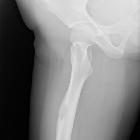tuberculosis of bone






skelettale Tuberkulose
tuberculosis of bone
muskuloskelettale Tuberkulose Radiopaedia • CC-by-nc-sa 3.0 • de
Musculoskeletal tuberculosis is always secondary to a primary lesion in the lung.
Epidemiology
The prevalence of the disease is around 30 million globally and 1-3% of the 30 million have involvement of their bones and/or joints. Mycobacterium tuberculosis is responsible for almost all of the cases of osteoarticular tuberculosis; although atypical mycobacteria have been reported in lesions of the synovial sheath.
The predisposing factors are protein-energy malnutrition, environmental conditions and living standards such as poor sanitation, overcrowded housing and slum dwelling. Trauma as a causative factor is debatable, but has been reported. Acquired immunodeficiency syndrome and other causes of immunocompromised status and repeated pregnancies and lactation in women are also a factor.
Pathology
Osteoarticular tuberculosis can occur in the spine, hip, knee, foot, elbow, wrist, hand, shoulder and as diaphysial foci. It has not been reported to affect the mandible or the temporomandibular joint. The major method of spread is haematogenous. The most common method of spread to the vertebral body is through the Batson prevertebral venous plexus.
Osteoarticular tuberculosis is reported in various sites including:
- tuberculosis of the spine
- tuberculous arthropathy
- tuberculosis of the tendon sheath and bursae
- tuberculous osteomyelitis
- tuberculous dactylitis
Siehe auch:
und weiter:

 Assoziationen und Differentialdiagnosen zu skelettale Tuberkulose:
Assoziationen und Differentialdiagnosen zu skelettale Tuberkulose:



